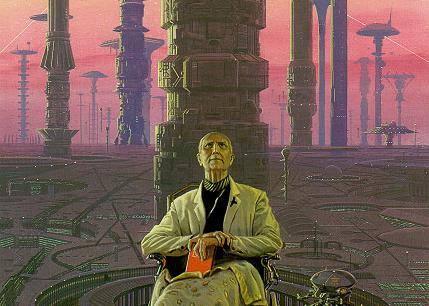 I first became conscious of Isaac Asimov when I was eleven or twelve, searching through the library catalogs for Star Wars novels. I must have been searching under the subject "science fiction" because Asimov's name came up again and again, to the point that I began to get irritated with him for clogging up my Star Wars search. In my head, I pronounced his name "Ayes-mov" and had not the slightest inclination to read anything he'd ever written.
I first became conscious of Isaac Asimov when I was eleven or twelve, searching through the library catalogs for Star Wars novels. I must have been searching under the subject "science fiction" because Asimov's name came up again and again, to the point that I began to get irritated with him for clogging up my Star Wars search. In my head, I pronounced his name "Ayes-mov" and had not the slightest inclination to read anything he'd ever written.For a few years now, however, I've been meaning to try some Asimov, and I'd heard Foundation was the place to start (maybe I shouldn't have started here, but one has to start somewhere, right?). And if I'm fair, though I have other Asimov books on my reading list, after Foundation, I'm not sure I really care enough to try anything else Asimov has written.
Foundation is like a summary of a historical epoch, spanning 150 years, occasionally dipping down to sample the specific characters and events that shape the history, but for the most part skimming the surface in the service of showing broader and more comprehensive themes. The novel begins with a sketch of the character Hari Seldon, who will become the seminal figure in Foundation, referenced like a god or a prophet, and details how Seldon, using his scientific discipline, psychohistory (a mixture of sociology, psychology, and economics in the service of old-fashioned fortune telling), manages to establish a colony on the edge of the galaxy, far from the center of the Empire, in the service of lessening the barbaric results of the Empire's inevitable decline.
A mouthful, yes? As soon as you've grasped that concept, Asimov skips you ahead fifty years and details the first of the "Seldon crises" as they come to be known - fore-told political crises that the established colony (the "Foundation") must face and overcome in order for the proper historical timeline (that Seldon mapped for 1,000 years into the future) to be followed. And once you've really gotten to know the characters involved in that particular crisis, Asimov once again skips forward in time, and so on throughout the course of the book.
Asimov has an odd style: talky, philosophic, and exhaustively expositive. I'm accustomed to broadly categorizing novels as either plot-based or character-based, but I'm not sure Foundation is either. Rather, it seems to be concerned primarily with the broad arcs of political and sociological change, which makes it unlike any other novel I've read but also makes it a little tiresome. Asimov teases us with characters that evoke depth and relatability, yet he never leaves them around long enough for us to fully connect, nor for them to become fully realized. He imagines situations that promise menace and suspense, and yet somehow each once is solved through wordy confrontations and whiffy capitulations.
Perhaps the main reason why Foundation fails to connect is the overriding psychohistory of it all. Its culture (and major characters) operate on a historical timeline that has been predicted 1,000 years into the future; because of this pervasive inevitability, it's difficult to muster any real sense of danger or tension. It doesn't help that Asimov's litany of powerful political figures who help confront and resolve the Seldon crises all operate within this same attitude of predestination - they all move one step ahead of their opponents, which means the book is littered with speeches wherein the characters unveil their foreknowledge and how they have, consequently, crushed their opponents' plans. It also means that, once we pick up on this propensity, we have no fear that any of the major characters are going to have anything surprising happen to them. Honestly, it makes for a dull read.
The characters, worlds, and situations Asimov imagines are tantalizing, and the philosophy that runs beneath all of it is suitably brainy and theoretical - yet the sum of the parts doesn't make much of a whole. I kept wishing he had made them all into a very different novel.
No comments:
Post a Comment